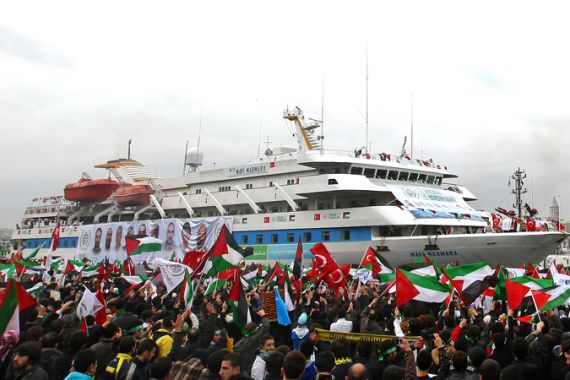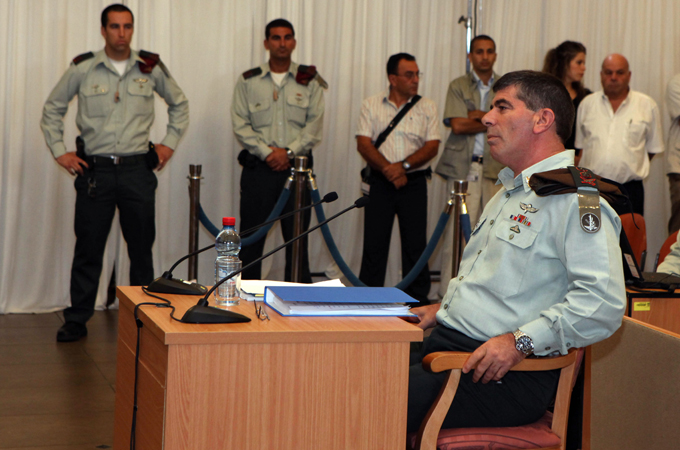Gaza raid was legal: Israeli panel
Contradicting a UN report, panel exonerates military of wrongdoing in the raid on Turkish aid flotilla.

 |
| The commission questioned several high-ranking Israeli officials, but was not given access to individual soldiers [EPA] |
Israel’s Gaza blockade and its deadly raid on a Turkish-led flotilla of ships carrying aid to the besieged strip in May last year were legal, an Israeli inquiry commission reported.
The core findings were issued on Sunday by an Israeli government-appointed panel made up of four Israelis and two foreign observers.
The report, which was was widely expected to exonerate the country’s military of any wrongdoing, contradicts a UN-backed report issued last year.
In September, a UN-appointed panel concluded that Israeli forces showed “incredible violence” during and after the raid on the flotilla that left eight Turkish activists and one Turkish-American dead.
The UN probe added that there was “clear evidence to support prosecutions” against Israel for “wilful killing” and torture committed when its troops stormed the aid flotilla last May.
Israel’s military response to the flotilla “betrayed an unacceptable level of brutality” and violated international law “including international humanitarian and human rights law,” the three-member panel said.
“The conduct of the Israeli military and other personnel towards the flotilla passengers was not only disproportionate to the occasion but demonstrated levels of totally unnecessary and incredible violence.”
The commando raid on the group of aid ships prompting international criticism of Israel’s actions and soured relations with several countries, particularly Turkey.
Pro-Israel commission
Israel established its own commission of inquiry after rejecting criticism that its troops had acted with excessive force in the raid.
On Sunday, media reports indicated that the commission’s first report was expected to clear the military of any wrongdoing, finding that Israeli commandos had shot in self-defence after being attacked by aid activists upon boarding their ships.
The commission is also expected to uphold the legality of Israel’s blockade of Gaza, which it imposed in June 2006 after Gilad Shalit, an Israeli soldier, was captured by Hamas fighters.
| IN DEPTH |
|
|
At least two of the commission’s members openly defended Israel’s actions during the raid while questioning some witnesses, particularly Israeli Arabs and human rights group representatives, according to the Jerusalem Post.
According to a commission spokesman, in addition to examining the legality of the blockade, the first report also provides an assessment “of the actions taken by the [Israeli army] to enforce the naval blockade” and “an examination of the actions taken by the organisers of the flotilla and its participants and their identity”.
The inquiry commission, headed by Yaakov Turkel, a former supreme court judge, is also reportedly examining several other aspects of the raid, and is expected to release a second report at an as yet unspecified date.
That report is expected to look at the mechanisms available for complaints about the raid.
High-ranking officials
The commission has heard testimony from high-ranking Israeli officials, including Binyamin Netanyahu, the Israeli prime minister, Ehud Barak, the defence minister, and General Gabi Ashkenazi, the army chief.
Giving testimony last year, Barak termed the flotilla a “planned provocation”. He said that top officials had suspected that the aid convoy’s organisers were “preparing for an armed conflict to embarrass Israel”.
“We regret any loss of life,” he said, “but we would have lost more lives if we had behaved differently.”
The commission also heard the testimony of several people who were on board the aid ships.
None of the soldiers who carried out the raid were authorised to provide their testimony. The commission was only authorised to speak to the army chief or Major-General Giora Eiland, who carried out the military’s own investigation into the incident, on matters relating to the military’s response.
Commission members were authorised to submit questions to individual soldiers who participated in the raid only through a military committee.
Other members of the commission include Shbati Rosenne, an international legal expert, retired Major-General Amos Horev, Miguel Deutch, a law professor at Tel Aviv University, Reuven Merhav, a former director-general of the foreign ministry.
Rosenne, who was 93-years-old, died on September 21 last year, while hearings were ongoing, and was not replaced.
The panel also had two foreign observers, Brigadier General Ken Watkin of Canada and Lord David Trimble of Northern Ireland, who were allowed to participate fully in the commission’s activities, but were not allowed to vote on decisions.
Turkish reaction
The raid on the flotilla severely damaged Israel’s relations with Turkey, which had been one of the few Muslim countries to enjoy friendly relations with it.
Cengiz Aktar, a journalist with the Turkish Daily News, told Al Jazeera that this latest report is unlikely to change that situation.
“I expect tomorrow quite a harsh reaction from the [Turkish] ministry of foreign affairs, because the report, at least the first part … looks … basically insufficient and very much one-sided. Yet another farcical report,” he said.
“The relationship between the two countries is slowing down at a tremendous pace, and this report won’t help. There were some attempts by some members of the Israeli cabinet, but it totally failed, and this report will be yet another blow.
“I think, tough times ahead, really.”
